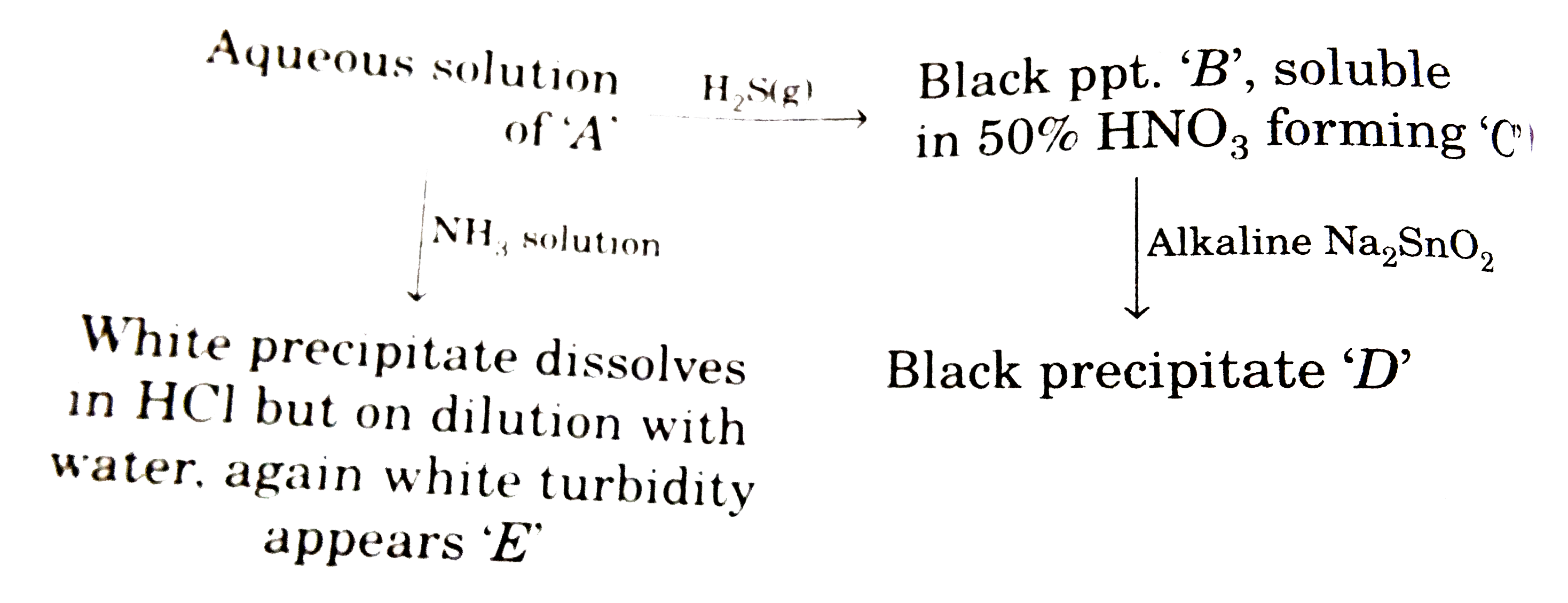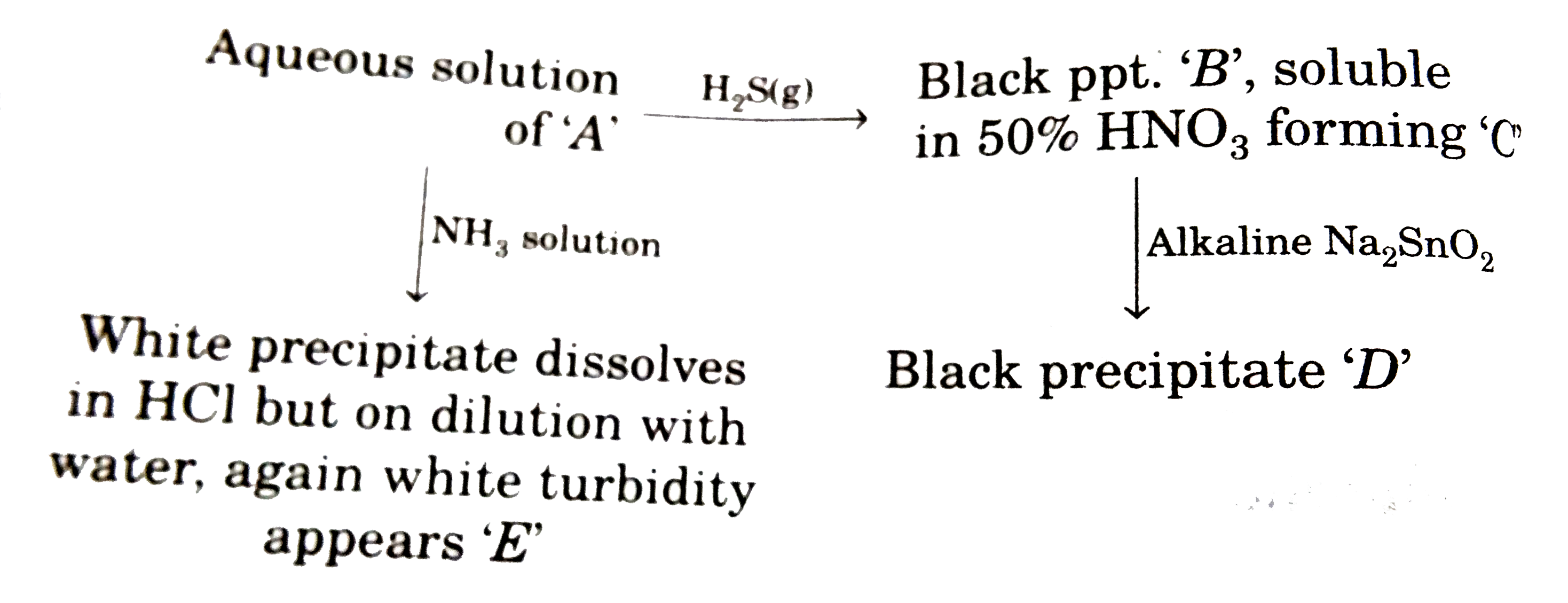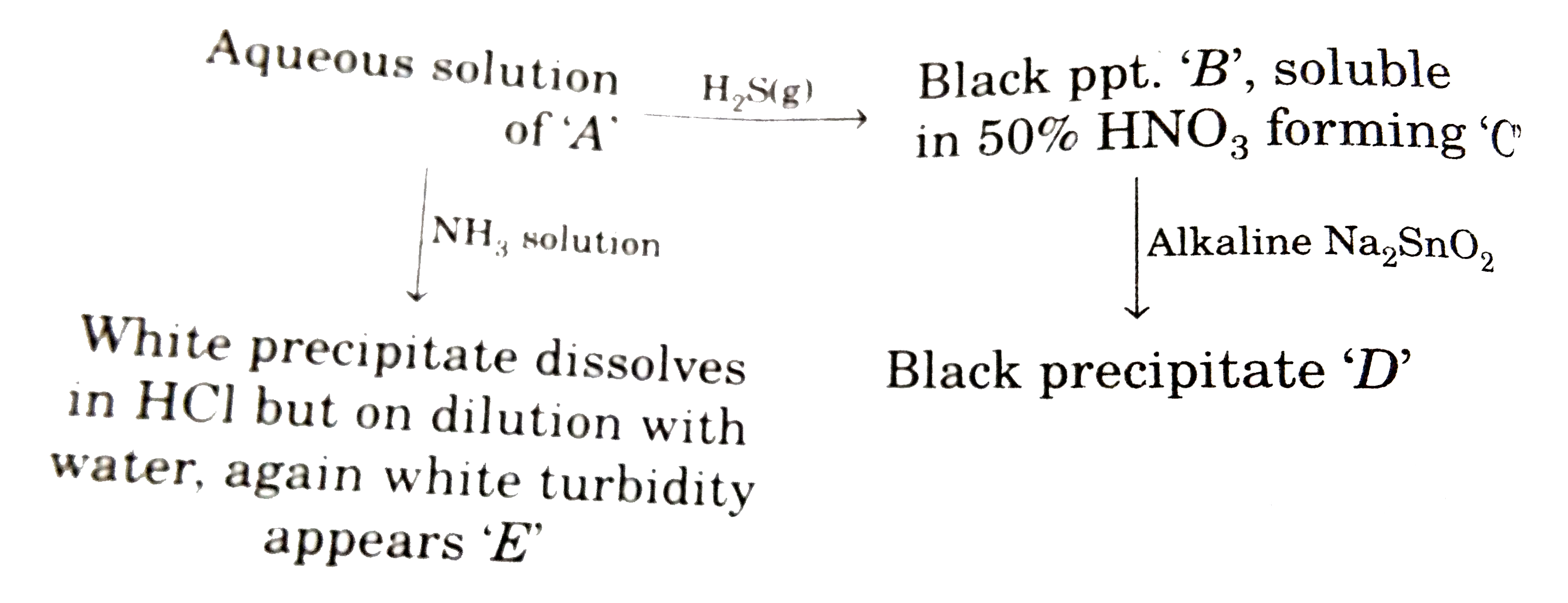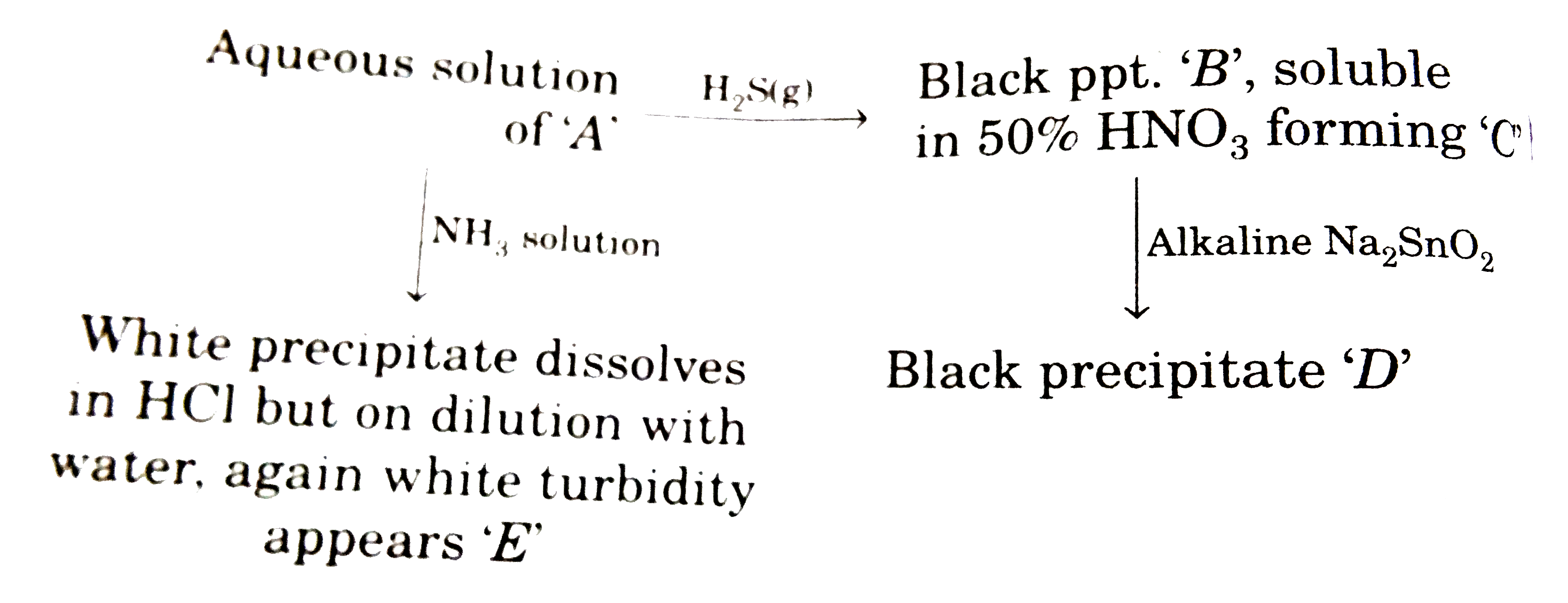
Moreover, the salt (A) on heating with solid K2Cr2O7 and concentrated H2SO4 produces deep red vapors which dissolve in sodium hydroxide solution forming a yellow solution. This yellow solution gives yellow precipitate with Ba(NO3)2 solution. On the basis of teh aforesaid characteristic informations answer the following questions:
Select the correct statement.
Aqueous solution of A reacts with AgNO3 solution to give white precipitate which turns yellow on treatement with sodium arsenite.
Aqueous solution of A produces white precipitate with sodium hydroxide which turns yellowish-white on boiling.
White turbidity E is soluble in dilute mineral acids.
All of the above
The correct Answer is:D
Topper's Solved these Questions
- SALT ANALYSISBOOK - GRB PUBLICATIONCHAPTER - SALT ANALYSISEXERCISE - Comprehension 2
1 Videos
- SALT ANALYSISBOOK - GRB PUBLICATIONCHAPTER - SALT ANALYSISEXERCISE - Comprehension 3
1 Videos
- SALT ANALYSISBOOK - GRB PUBLICATIONCHAPTER - SALT ANALYSISEXERCISE - Comprehension 1
1 Videos
- S BLOCK ELEMENTSBOOK - GRB PUBLICATIONCHAPTER - S BLOCK ELEMENTSEXERCISE - SUBJECTIVE TYPE
9 Videos
- THERMODYNAMICSBOOK - GRB PUBLICATIONCHAPTER - THERMODYNAMICSEXERCISE - All Questions
704 Videos
Similar Questions
Knowledge Check

Moreover, the salt (A) on heating with solid K2Cr2O7 and concentrated H2SO4 produces deep red vapors which dissolve in sodium hydroxide solution forming a yellow solution. This yellow solution gives yellow precipitate with Ba(NO3)2 solution. On the basis of teh aforesaid characteristic informations answer the following questions:
The black precipitate F on heating with water produces:AHg(OH)2BBiOICBiO.OHDCuO.OH
Moreover, the salt (A) on heating with solid K2Cr2O7 and concentrated H2SO4 produces deep red vapors which dissolve in sodium hydroxide solution forming a yellow solution. This yellow solution gives yellow precipitate with Ba(NO3)2 solution. On the basis of teh aforesaid characteristic informations answer the following questions:
Which of the following statements is incorrect?AThe black precipitate D is of bismuthBThe black precipitate D is of Hg+Hg(NH2)NO3CAqueous solution of A gives yellow precipitate with freshly prepared 10% solution of pyrogallol.DAqueous solution of A gives red precipitate with 8-hydroxyqunoline (5%) and potassium iodide (6M) in acidic medium.
Moreover, the salt (A) on heating with solid K2Cr2O7 and concentrated H2SO4 produces deep red vapors which dissolve in sodium hydroxide solution forming a yellow solution. This yellow solution gives yellow precipitate with Ba(NO3)2 solution. On the basis of teh aforesaid characteristic informations answer the following questions:
Acidified solution of A, on treatment with KI gives black precipitate F which dissolves in excess of reagent forming the coloured compound G. The chemical composition of F and G are respectively:AHgI2 and [HgI4]2−BPbI2 and [PbI4]2−CBiI3 and [BiI4]−DCu2I2 and CuI2

Moreover, the salt 'A' on heating with solid K2Cr2O7 and concentrated H2SO4 produces deep red vapours which dissolve in sodium hydroxide solution forming a yellow solution. This yellow solution gives yellow precipitate with Ba((NO)3)2 solution.
On the basis of the aforesaid characteristic informations answer the following question :
Reaction involved in comprehension :
2Bi3+(A)+3H2SH+−−→Bi2S3⏐⏐↓(black)(B)+6H+
Bi2S3+8HNO3→2Bi(NO3)3(C)+2NO+3S+4H2O
Bi3++3OH−NaOH−−−→Bi(OH)3⏐⏐↓(white),2Bi(OH)3(white)+3[Sn(OH)4]2−→2Bi⏐⏐↓(D)+3[Sn(OH)6]2−
Bi3++3OH−Na4OH−−−−→Bi(OH)3⏐⏐ ⏐↓(white),Bi(OH)3daar(white)+3HCl→BiCl3+3H2O
BiCl3+H2O→BiOCl⏐↓(bismuth oxychloride)(E)+2HCl
4NaCl+K2Cr2O7+3H2SO4(conc.)→2CrO2Cl2(deep red vapours)+2Na2SO4+K2SO4+3H2O
CrO2Cl2+4OH−→CrO2−4+2Cl−+2H2O
CrO2−4+BaCrO4⏐⏐↓ (yellow)
Acidified solution of 'A' on treatment with Kl gives black precipitate 'F' which dissolves in excess of reagent forming the coloured compound 'G'.The chemical composition of 'F' and 'G' are respectively:
View Solution
Moreover, the salt 'A' on heating with solid K2Cr2O7 and concentrated H2SO4 produces deep red vapours which dissolve in sodium hydroxide solution forming a yellow solution. This yellow solution gives yellow precipitate with Ba((NO)3)2 solution.
On the basis of the aforesaid characteristic informations answer the following question :
Reaction involved in comprehension :
2Bi3+(A)+3H2SH+−−→Bi2S3⏐⏐↓(black)(B)+6H+
Bi2S3+8HNO3→2Bi(NO3)3(C)+2NO+3S+4H2O
Bi3++3OH−NaOH−−−→Bi(OH)3⏐⏐↓(white),2Bi(OH)3(white)+3[Sn(OH)4]2−→2Bi⏐⏐↓(D)+3[Sn(OH)6]2−
Bi3++3OH−Na4OH−−−−→Bi(OH)3⏐⏐ ⏐↓(white),Bi(OH)3daar(white)+3HCl→BiCl3+3H2O
BiCl3+H2O→BiOCl⏐↓(bismuth oxychloride)(E)+2HCl
4NaCl+K2Cr2O7+3H2SO4(conc.)→2CrO2Cl2(deep red vapours)+2Na2SO4+K2SO4+3H2O
CrO2Cl2+4OH−→CrO2−4+2Cl−+2H2O
CrO2−4+BaCrO4⏐⏐↓ (yellow)
The black precipitate 'F' on heating with water produces :
View Solution
Moreover, the salt 'A' on heating with solid K2Cr2O7 and concentrated H2SO4 produces deep red vapours which dissolve in sodium hydroxide solution forming a yellow solution. This yellow solution gives yellow precipitate with Ba((NO)3)2 solution.
On the basis of the aforesaid characteristic informations answer the following question :
Reaction involved in comprehension :
2Bi3+(A)+3H2SH+−−→Bi2S3⏐⏐↓(black)(B)+6H+
Bi2S3+8HNO3→2Bi(NO3)3(C)+2NO+3S+4H2O
Bi3++3OH−NaOH−−−→Bi(OH)3⏐⏐↓(white),2Bi(OH)3(white)+3[Sn(OH)4]2−→2Bi⏐⏐↓(D)+3[Sn(OH)6]2−
Bi3++3OH−Na4OH−−−−→Bi(OH)3⏐⏐ ⏐↓(white),Bi(OH)3daar(white)+3HCl→BiCl3+3H2O
BiCl3+H2O→BiOCl⏐↓(bismuth oxychloride)(E)+2HCl
4NaCl+K2Cr2O7+3H2SO4(conc.)→2CrO2Cl2(deep red vapours)+2Na2SO4+K2SO4+3H2O
CrO2Cl2+4OH−→CrO2−4+2Cl−+2H2O
CrO2−4+BaCrO4⏐⏐↓ (yellow)
Which of the following statements is incorrect ?
View SolutionWhich of the following compound(s) give yellow precipitate with BaCI2 solution?
View SolutionWhich of the following salt on heating with solid K2Cr2O7 and Conc. H2SO4 , orange red vapours are evolved which turn NaOH solution yellow.
View Solution

